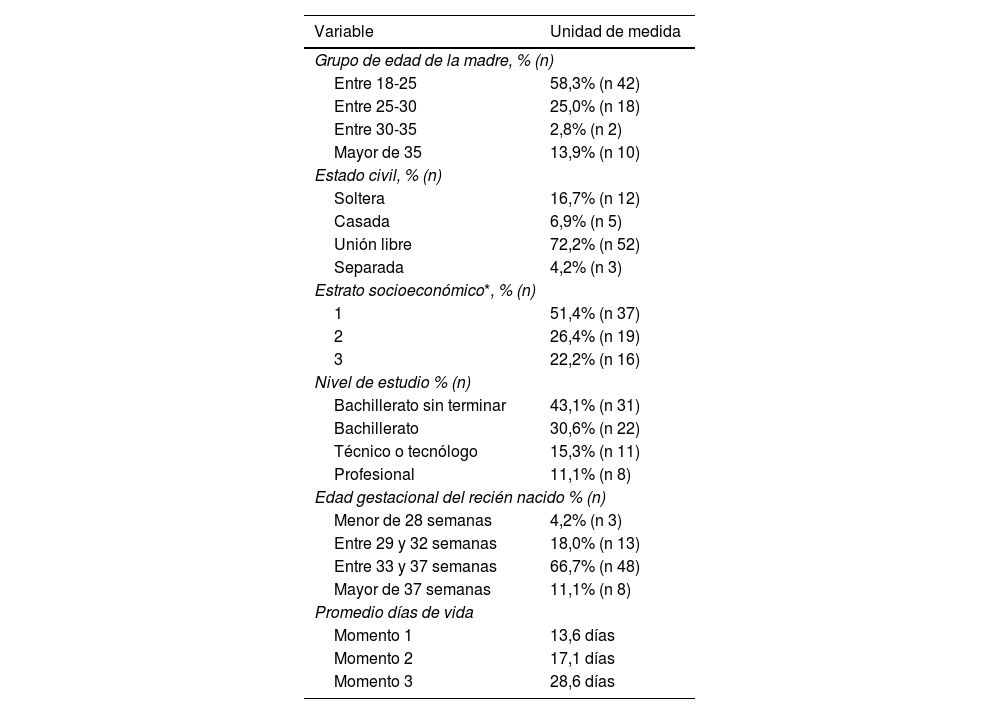Las madres de los recién nacidos (RN) que egresan de una unidad de cuidado intensivo neonatal (UCIN) presentan estrés y ansiedad por el cuidado especializado que su hijo/a necesita en el hogar, afectando la percepción de la autoeficacia materna.
ObjetivoEvaluar el efecto de la intervención enfermera Plan de Alta Hospitalaria (PAHO) sobre la promoción de la autoeficacia en madres de RN que egresan de la UCIN.
MétodoEstudio cuantitativo, diseño cuasiexperimental con preprueba/posprueba en un solo grupo, con la aplicación de la Escala de Evaluación Parental a una muestra por conveniencia de 72 madres de RN de alto riesgo, de una UCIN ubicada en la ciudad de Villavicencio (Colombia), la primera medición se realizó entre los días tres y cuatro antes del egreso y a los 15 días posteriores. El procesamiento de datos se llevó a cabo mediante el programa estadístico SPSS, versión 21. La intervención se basó en los cuatro conceptos de la teoría de autoeficacia de Barbara Resnick.
ResultadosLa percepción de autoeficacia materna antes de la intervención presentó una mediana de 8,9 puntos (rango intercuartílico [IQR] 7,6-9,5); posterior a esta se observó una mediana de 9,6 puntos (IQR 10-8,7); de forma comparativa antes y después de la intervención con la prueba de rangos de Wilcoxon se obtuvo un valor p<0,001 estadísticamente significativo.
ConclusionesLa educación y seguimiento promovió en las mujeres el desarrollo de conocimientos y habilidades para el cuidado del RN de alto riesgo, aportó a la experiencia vicaria y de dominio a partir del proceso de enseñanza-aprendizaje y del contacto con la vivencia de otras madres, lo que contribuye al desarrollo efectivo de la maternidad.
The mothers of newborns who are discharged from a neonatal intensive care unit (NICU) experience stress and anxiety due to the specialized care their child requires at home, affecting their perception of maternal self-efficacy.
Objectiveto evaluate the effect of the nursing intervention called Hospital Discharge Plan (HDP) on the promotion of self-efficacy in mothers of newborns discharged from the NICU.
MethodQuantitative study, quasi-experimental design with pre-test/post-test in a single group, using the Parental Evaluation Scale applied to a convenience sample of 72 mothers of high-risk newborns from a NICU located in the city of Villavicencio (Colombia). The first measurement was taken between days 3 and 4 before discharge and at 15 days’ post-discharge. Data processing was carried out using the statistical program SPSS, version 21. The intervention was based on the four concepts of self-efficacy by Barbara Resnick.
ResultsThe perception of maternal self-efficacy before the intervention showed a median of 8.9 points (RI 7.6-9.5); after the intervention it showed a median of 9.6 points (RI of 10-8.7); a statistically significant p-value < 0.001 was obtained before and after the intervention with the Wilcoxon rank test.
ConclusionsEducation and follow-up promoted the development of knowledge and skills in mothers for the care of high-risk newborns. This contributed to the experience of mastery and vicarious experience from the teaching-learning process and contact with the experience of other mothers, which contributes to the effective development of motherhood.
Artículo
Comprando el artículo el PDF del mismo podrá ser descargado
Precio 19,34 €
Comprar ahora











